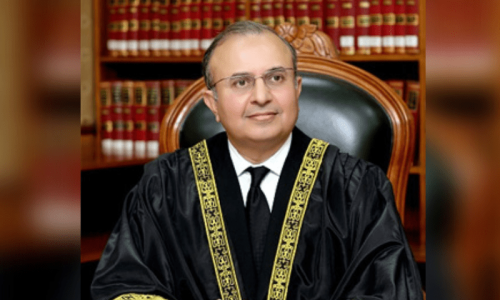LONDON: The British prime minister, Gordon Brown, is losing the confidence of his cabinet as an increasing number of ministers voice the fear that Labour cannot win the general election under the prime minister’s leadership, authoritative sources said on Friday.
Labour’s disastrous performance in a parliamentary by-election in the normally Labour safe seat of Crewe and Nantwich in the early hours of Friday leading to the opposition Tories’ (Conservatives) first by-election gain in a quarter of a century has persuaded cabinet ministers that the prime minister’s position is fast becoming irretrievable.
“People are not far away from thinking that we cannot win under Gordon Brown,” a senior Labour figure said last night. “We wish it was different from what it is. But it is hard to avoid looking at the facts.”
The growing collapse in confidence in Brown’s leadership became clear on Friday in the wake of Labour’s poor by-election performance as the Tories won on a swing of 17.6 per cent the sort of figure that would place the Conservative leader, David Cameron, in Downing Street with a substantial parliamentary majority.
Had the by-election happened on its own, Brown would probably face no more than a whispering campaign, senior sources say. But two factors are convincing cabinet ministers that Labour’s poor performance is directly linked to the prime minister: local election reverses earlier this month, and Brown’’s decision to give away GBP2.7bn in tax cuts in an emergency mini-budget designed to solve the crisis provoked by the abolition of the 10p starting rate of income tax in his last budget as chancellor (finance minister) last year.
The mini-budget was intended to wrong foot the Tories and avoid a parliamentary crisis that would have been provoked if Labour rebels had voted down the finance bill. “Gordon threw GBP2.7bn at this and the result in Crewe and Nantwich was worse than we feared,” the senior party figure said.
Brown insisted on Friday that he was determined to carry on. “The task that I have set for myself is that we take this economy through difficult times into a future where we have both fairness for all and prosperity for the British people,” he said. “That is the challenge I am going to meet for the British people.”
Harriet Harman, Labour’s deputy leader, and Ed Miliband, the Cabinet Office minister and one of Brown’s closest allies, rallied to the prime minister’s defence. Harman acknowledged that there were “discordant voices” within the party, but she dismissed suggestions of a move against Brown: “I don’t think that will happen.”
Miliband spoke up for the prime minister. “We have got the right leader, we elected the right leader unopposed last year, and we have got the right leader to take us into the general election,” he said.
Labour figures said it was significant that the only cabinet ministers to appear on the high-profile broadcasting programmes were key allies. “Where was the rest of the cabinet?” one senior party figure asked.
The unease about Brown surfaced after a meeting of the political cabinet on Tuesday. “People did not come out thinking they had seen a brilliant masterplan that was going to get Labour out of this,” said one senior figure. Another source said: “The political cabinet was awful. The tank is empty.”
The main criticism is that Brown appears unable to go beyond saying he is the best man to deal with challenging economic times, a message that failed to sway voters in the local elections and in Crewe and Nantwich. Labour sources stress there is no appetite for a direct challenge against the prime minister. Cabinet ministers are said to be discussing what to do. The most they are planning at the moment is to persuade Brown that he needs to “change his script”. “The cabinet is not revolting against Gordon Brown,” one influential figure said. “It does wish that he could work it out. The first stage is to move out of denial.”—Dawn/ The Guardian News Service










































Dear visitor, the comments section is undergoing an overhaul and will return soon.